Dealing with a landlord-tenant dispute or eviction can be stressful—but understanding your rights under Texas law can make all the difference. Whether you're a landlord trying to protect your property or a tenant fighting to keep your home, an eviction attorney in Houston, Texas, can be your guide through a high-stakes process governed by the Texas Property Code. They can handle the entire ordeal, from drafting the right notices to standing up for you in court.
Handling a Houston Eviction Without the Stress
A landlord-tenant dispute is deeply personal. For landlords, a tenant who won't pay rent or respect the property can drain your finances and cause endless headaches. For tenants, an eviction notice can feel like a threat to your family's stability and peace of mind.
No matter which side you're on, the first step is to get clear on your rights and responsibilities. This process involves more than just legal paperwork; it can be an emotional and financial battle. Knowledge is your most powerful tool. A calm, clear-headed understanding of the legal road ahead can turn fear into a solid plan.
The Current Eviction Landscape in Houston
The eviction situation in Houston is intense. The city has become one of the nation's biggest hotspots for eviction filings.
In a recent month, landlords filed 6,536 eviction cases. That number is a staggering 53% higher than pre-pandemic averages, and it happened during a month that's usually slow for filings. The pressure in the rental market is real and it's not letting up.
With so many cases flooding the local Justice of the Peace courts, the system is overloaded. One tiny mistake can get your case thrown out. Whether you’re a landlord trying to meet all your landlord responsibilities in Texas or a tenant building a defense, there is zero room for error.
A single mistake, like an improperly worded 'Notice to Vacate,' can force a judge to dismiss your case. You'll be back at square one, losing precious time and money.
Hiring a seasoned Houston eviction attorney isn't a luxury—it's a critical move to protect what's yours. An attorney ensures every legal requirement is met, from the first notice to the final word in court. It’s how you face this challenge with a real strategy, not just hope.
What the Texas Property Code Says About Evictions
The Texas eviction process isn't a casual negotiation. It's a strict legal roadmap laid out in the Texas Property Code, and you must follow every step exactly as the law demands.
One small mistake—even a tiny error on that first notice—can force you to start the whole process over. That means more lost time, more lost rent, and more stress while the property remains occupied.
Navigating this can feel overwhelming, but understanding each stage is how you can turn uncertainty into confidence and take back control of your situation.
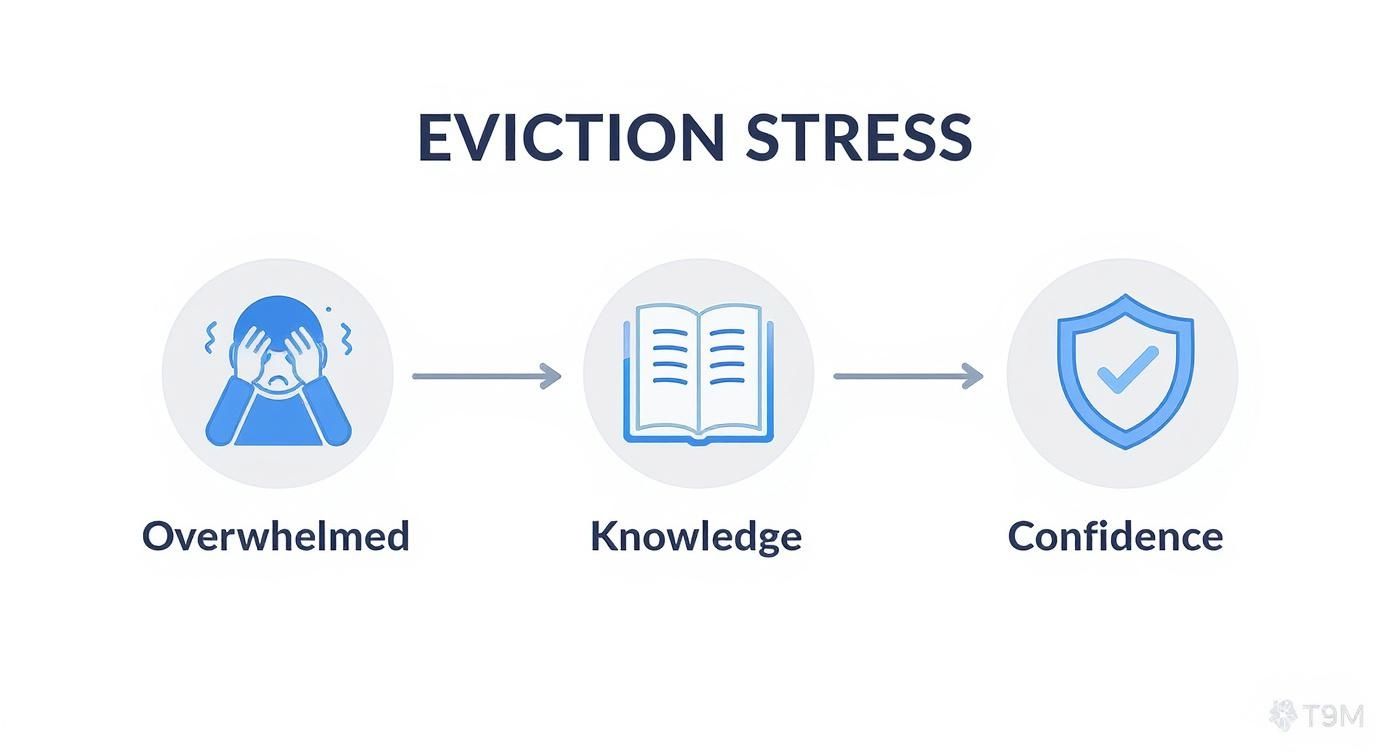
As you can see, the path from anxiety to action starts with a solid grasp of the legal steps. It's the only way to move forward with a real plan.
To give you a high-level view, here’s a breakdown of what the eviction journey looks like in Texas.
Key Stages of the Texas Eviction Process
| Stage | What It Involves | Governing Texas Property Code Section(s) | Typical Timeline |
|---|---|---|---|
| Notice to Vacate | A formal, written demand for the tenant to leave the property by a specific date. This must be delivered correctly. | § 24.005 | 3 days for non-payment of rent (unless the lease states otherwise). |
| Filing the Suit | If the tenant doesn't leave, the landlord files a "Forcible Detainer" lawsuit in the local Justice of the Peace (JP) court. | § 24.0051 | 10-21 days after filing until the court date. |
| Court Hearing | Both landlord and tenant present their cases to a judge. The judge issues a ruling. | § 24.0053 | The hearing itself usually happens quickly, often on the scheduled day. |
| Appeal Period | The losing party has 5 days to appeal the judge's decision to a higher court. | § 24.0052 | 5 calendar days following the judgment. |
| Writ of Possession | If the tenant doesn't leave or appeal, the landlord gets a court order allowing law enforcement to remove the tenant. | § 24.0061 | At least 24 hours after the constable posts a final warning. |
This table maps out the core legal milestones. Now, let’s dig into what each of these steps actually means for you.
Step 1: The Notice to Vacate
Everything kicks off with the Notice to Vacate. This isn't just a friendly heads-up; it's the formal legal document that starts the eviction clock ticking. For non-payment of rent, Texas law usually requires a 3-day notice, but always double-check your lease—it might specify a different timeframe.
How you deliver this notice is critical. Under Texas Property Code Section 24.005, you have three options:
- In Person: Hand it directly to the tenant or anyone at the property who is 16 or older.
- By Mail: Send it via certified or regular mail to the rental address.
- Posted: Securely tape it to the inside of the main entry door.
The notice itself has to be perfect. It must clearly state why you're evicting, the exact rent owed (if that's the reason), and an unconditional demand to leave by a set date. Any vague language can get the notice thrown out. For a deeper look at the rules, you can learn more about the complete eviction process in Texas in our detailed article.
Step 2: Filing the Eviction Suit
If the deadline on your notice comes and goes and the tenant is still there, your next move is filing an eviction lawsuit. In Texas, this is officially called a Forcible Detainer suit.
You'll file this at the Justice of the Peace (JP) court in the precinct where your property is located. Harris County has several JP precincts, so make absolutely sure you're filing in the right one.
Filing means submitting a sworn complaint that lays out the facts: why you're evicting and proof that you served a proper Notice to Vacate. This is where precision is everything. An experienced Houston eviction attorney makes sure this paperwork is flawless to avoid unnecessary delays.
Landlord Scenario: John, a Houston landlord, decided to file an eviction suit himself. He made one mistake: he listed the wrong amount of rent due on the court petition. The judge had no choice but to dismiss the case. John had to start all over again with a new notice, losing three more weeks of rent.
Once filed, the court issues a citation—the official notice that a lawsuit has been filed. A constable or sheriff's deputy then serves this citation to the tenant, letting them know the court date.
Step 3: The Court Hearing and Judgment
The court hearing is your day to present your case to the judge. You (or your lawyer) must come prepared with all your evidence: the lease, payment ledgers, a copy of the Notice to Vacate, and any texts, emails, or photos that back up your claim.
The tenant gets their chance to speak, too, and can present a defense. After hearing both sides, the judge makes a ruling. If you win, the judge issues a judgment for possession of the property. For a complete look at how this all plays out, check out this excellent step-by-step guide on how to evict a tenant.
Step 4: The Writ of Possession
Winning in court doesn't mean you can run over and change the locks. The process isn't over just yet.
The tenant has five days to either move out or appeal the judge's ruling. If they do nothing, then you can request a Writ of Possession.
This is the final, non-negotiable step. A Writ of Possession is a court order that gives a constable the authority to physically remove the tenant and their belongings from your property. The constable will first post a 24-hour warning on the door. After that, they will return to oversee the removal and officially give you back your property.
Valid Reasons for Eviction in Houston
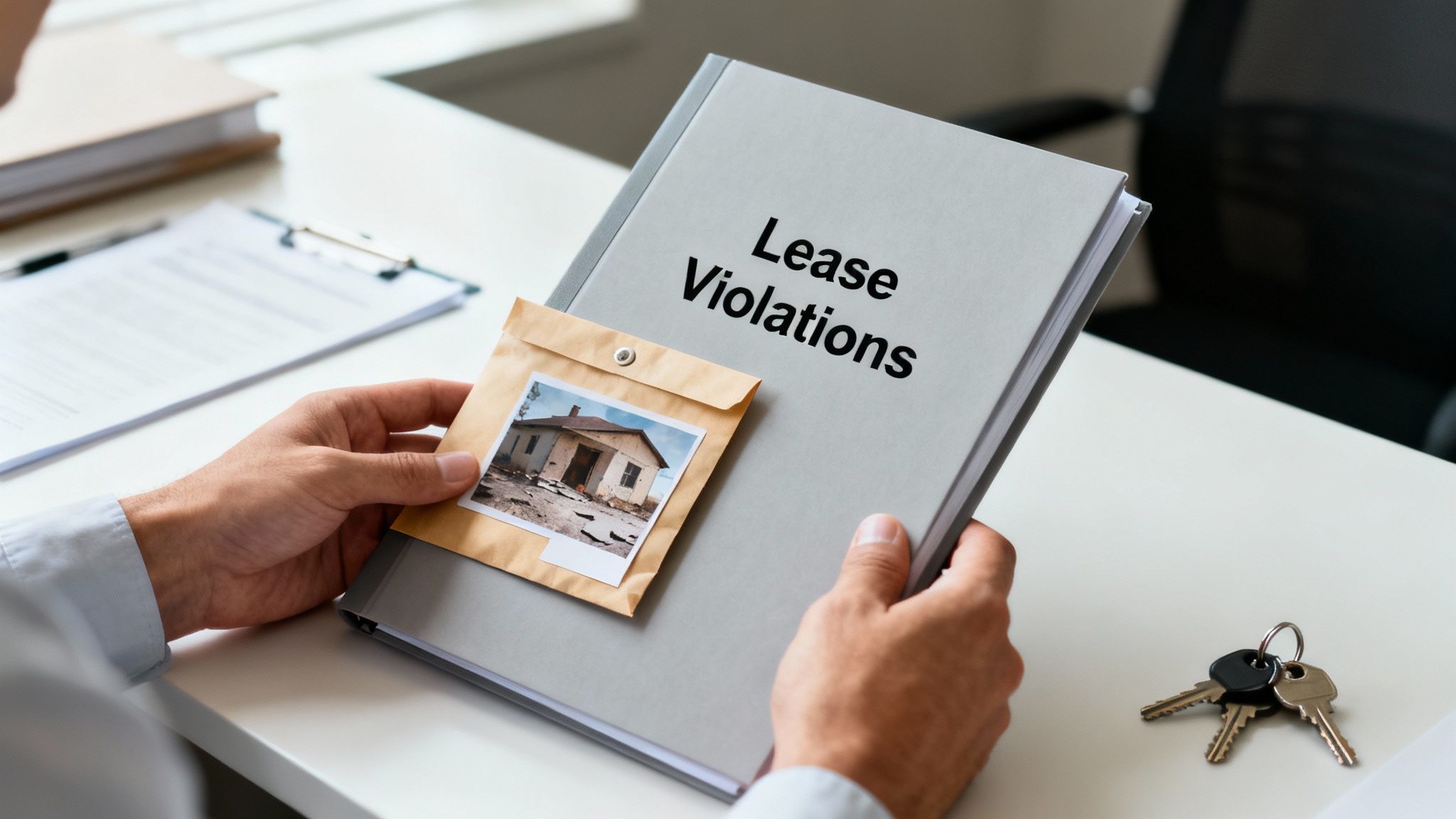
When landlords think of eviction, the first thing that usually comes to mind is unpaid rent. While that’s the most frequent reason, it's far from the only legitimate one. Texas law gives property owners the right to reclaim their property for several solid reasons—but those reasons must be clearly spelled out in your lease agreement.
Think of an eviction as proving that a tenant's actions directly violated a specific term of your legally binding contract. If you can’t draw a straight line from their action to a broken rule in the lease, a Harris County judge may not see things your way. This is why a strong, clear lease is your single most important tool.
The sheer number of cases flooding Houston courts shows just how crucial it is to get this right. Last year alone, Harris County saw a staggering 76,321 eviction cases filed. That's about one filing for every ten rental households. While that figure is down slightly, filing rates are still running roughly 20% higher than they were before the pandemic. Eviction is clearly a major ongoing issue for local landlords. You can dig deeper into these numbers by checking out local housing reports that track these community trends.
Material Lease Violations
Your lease agreement is the rulebook for the tenancy. When a tenant breaks one of the important rules in that book, it’s called a material lease violation, and it gives you a valid reason to start the eviction process.
Here are a few common examples:
- Unauthorized Occupants: The lease names who is allowed to live on the property. If your tenant moves in a relative or friend without your written permission, they have breached the contract.
- Unauthorized Pets: If you have a strict no-pets policy or restrict certain breeds and a tenant brings in an unapproved animal, that’s a clear violation.
- Significant Property Damage: This isn't about scuffed paint. We’re talking about serious damage beyond normal wear and tear—like knocking down walls, causing major water damage from carelessness, or destroying fixtures.
Landlord Scenario: Imagine Sarah, a landlord, discovers her tenant is running an unlicensed car repair shop out of the garage, a direct violation of the "residential use only" clause in her lease. The concrete floor is ruined with oil stains and neighbors are complaining. This gives Sarah clear grounds to issue a Notice to Vacate.
Holding Over After a Lease Ends
Sometimes, the problem isn't a broken rule but a tenant who simply won't leave. When a lease term ends and you decide not to renew, the tenant is legally obligated to move out. If they stay without your permission, they become a "holdover tenant."
This situation also gives you legal grounds to evict. The steps are the same: you must provide a written Notice to Vacate—usually a three-day notice—before you can file a suit in the Justice of the Peace court.
Illegal Activity on the Property
This is one of the most serious lease violations. If a tenant is engaging in criminal acts on your property, Texas Property Code Section 91.003 gives you an accelerated path to remove them.
This applies to drug-related crimes, acts of violence, or any other illegal conduct on the premises. For these major offenses, the law lets you terminate the lease immediately and file for eviction. However, be prepared: you will need solid proof, like police reports or witness testimony, to make your case in court. In these high-stakes situations, having an experienced eviction attorney in Houston, Texas, on your side is essential.
When to Hire a Houston Eviction Attorney
Trying to handle a Texas eviction on your own can feel like walking through a minefield. The Harris County Justice Courts have very specific, unbending rules. One small mistake—a misfiled form, an incorrect notice—can get your case thrown out, sending you right back to square one.
You lose time, you lose money, and the problem tenant remains in your property.
While a simple eviction for non-payment might seem straightforward, some situations are a clear signal to seek professional help. Knowing when to call an eviction attorney in Houston, Texas, isn't just about convenience; it's a critical strategic decision to protect your rights.
Your Tenant Is Gearing Up for a Fight
Some tenants will leave after receiving a Notice to Vacate. Others will dig in their heels and prepare for a legal battle. If you believe your tenant will contest the eviction, getting an attorney involved from the start is your best move.
Tenants can get legal help from legal aid organizations or represent themselves. Either way, they may come to court with arguments ready, claiming things like:
- You’re evicting them in retaliation for repair requests they made.
- You accepted a partial rent payment, which they’ll argue "cured" the default.
- The Notice to Vacate was delivered improperly or had incorrect information.
An experienced Texas landlord tenant lawyer has seen these defenses before. They know how to anticipate these arguments and build a rock-solid case with evidence to counter them, ensuring the judge hears a clear, fact-based story.
The Lease Agreement Is a Mess
Your lease is the foundation of your agreement. But what if it’s vague, has handwritten notes, or is an outdated template from the internet? A weak lease is a huge liability in court.
A tenant can exploit unclear clauses to argue they never actually violated the terms. For instance, if your lease says "no pets" but doesn't define what that means, a tenant could argue that pet-sitting for a friend wasn’t a true breach of the contract.
An eviction attorney can analyze your lease, pinpoint its weaknesses, and frame the tenant's violation in the clear context of Texas law, making your case far more powerful.
An attorney isn’t just a form-filler. They are a strategic advisor protecting your immediate interests and your long-term investment. They make sure every step you take is legally sound, minimizing your risk and maximizing your chances of a successful outcome.
The Tenant Has Filed for Bankruptcy
Nothing stops an eviction faster than a bankruptcy filing. The moment your tenant files, federal law puts an "automatic stay" in place. This is a court order that freezes all collection activities, including your eviction lawsuit.
If you move forward with the eviction after they’ve filed, you are violating federal law, and the penalties can be severe.
To get the eviction back on track, your attorney must file a "Motion to Lift the Automatic Stay" in federal bankruptcy court. This is a complex legal process that is outside the scope of what a landlord should handle alone. You absolutely need an eviction attorney with bankruptcy experience to navigate this, get the court's permission, and finally regain possession of your property.
In these situations, hiring a lawyer isn't just another expense—it's an investment in protecting your property, your rights, and your peace of mind.
Common Tenant Defenses in an Eviction Case
Walking into an eviction hearing unprepared is a recipe for disaster. Tenants have every right to defend themselves in court, and knowing their likely arguments ahead of time is your best defense. This isn't about guessing games; it's about building a solid case that anticipates and dismantles their claims with facts.
An experienced eviction attorney in Houston, Texas, has heard it all before. They know exactly how to counter these common defenses with hard evidence. Let's break down what you can expect to face.
The "Improper Notice" Defense
This is one of the most frequent—and successful—arguments a tenant can make. The Texas Property Code is incredibly strict about the Notice to Vacate. One tiny mistake, and a judge can throw your entire case out.
A tenant's lawyer will look for any flaw, arguing that:
- The notice didn't give them the required three days to leave (for non-payment cases).
- You delivered it incorrectly. Leaving it on the porch isn't enough; it must be handed to someone, mailed, or posted on the inside of the front door.
- The notice itself was flawed, listing the wrong amount of rent owed or being vague about the reason for eviction.
Real-world scenario: A landlord, frustrated with late rent, texts the tenant to get out in 24 hours. In court, the tenant's attorney simply points to the law. The judge has no choice but to dismiss the case because the notice was invalid. All that time and money is wasted.
The "Retaliation" Defense
Judges take this one very seriously. Under Texas Property Code Section 92.331, you cannot evict a tenant as punishment for them exercising a legal right.
A tenant might claim you're retaliating if you file for eviction right after they:
- Asked for a critical repair you didn't make.
- Called a city health inspector on you.
- Started or joined a tenants' union.
To defeat this, you need a clear, non-retaliatory reason for the eviction and the paperwork to prove it. This means having pristine records, like payment ledgers showing a history of late payments that started before they ever complained.
The "Waiver" Defense (Accepting Partial Payment)
This one is all about your actions. Let's say your tenant is late on rent, you serve them a Notice to Vacate, but then you accept a partial rent payment from them. A tenant can argue that you "waived" your right to evict them for that month's rent.
By cashing that check, you've sent a mixed signal. A judge will likely see it as you forgiving the violation and re-establishing the lease, which kills your current eviction case.
Here’s how it plays out: The tenant is behind on May's rent, and you file for eviction. A week later, they give you half the money, and you take it. In court, they'll argue that your acceptance of the payment means the eviction is off. That's why any good Texas landlord tenant lawyer will tell you: once the eviction process starts, do not accept any rent payments without first consulting your attorney.
Choosing the Right Eviction Attorney in Houston

When you're facing an eviction, not just any lawyer will do. This is the single most important decision you'll make. You need a legal partner who lives and breathes Texas landlord-tenant law.
You need someone who knows the Texas Property Code backward and forward and who understands the unique procedures of the Harris County Justice Courts.
Think of it this way: you wouldn't hire a divorce attorney to handle a tax audit. An attorney who only dabbles in evictions won't have the focused, on-the-ground experience to protect your property effectively. You need a specialist.
What to Look for in a Houston Eviction Lawyer
Your goal is simple: find an attorney who has seen it all and won. You're looking for someone whose expertise is perfectly matched to your situation. Their knowledge of local court quirks is just as critical as their understanding of state law.
Here’s what really matters:
- Deep Experience in Harris County Justice Courts: The right lawyer knows the clerks, the judges, and the unwritten rules of the local courts. This home-field advantage can make or break a case.
- A Command of the Texas Property Code: They should be able to break down your rights and obligations into plain English, pointing to the exact laws that back up their strategy.
- A Laser Focus on Landlord-Tenant Law: A dedicated practice means they're always up to date on the latest legal challenges and defensive tactics tenants use.
Critical Questions to Ask During a Consultation
That first meeting is your opportunity to interview a potential legal partner. You’re evaluating if they’re the right person to protect your investment. Don't be shy about asking direct questions.
A good attorney doesn't just tell you what you want to hear. They give you the straight truth—a realistic look at your case, a clear game plan, and an honest assessment of the potential bumps in the road.
Walk into that consultation prepared. Here are a few essential questions to ask:
- How many landlord-side eviction cases have you personally handled in Harris County in the last year?
- Based on the details of my case, what's your initial strategy?
- What are the most common tenant defenses you're seeing right now, and how do you fight them?
- How does your fee structure work? Is it a flat fee for a standard eviction, or do you bill by the hour?
Finding a legal advocate you trust is everything. The right attorney won’t just get your property back; they'll help you do it the right way, protecting your financial interests for the long haul.
Common Questions About Houston Evictions
If you're facing an eviction, you probably have many questions. Getting clear, direct answers is the only way to make smart decisions that protect your property while staying on the right side of Texas law.
Let's clear up some of the most common questions we hear from Houston-area landlords and tenants.
How Long Does the Eviction Process Take in Houston?
A straightforward eviction in Harris County, where everything goes smoothly, usually takes about 3 to 6 weeks. That’s the timeline from the moment the Notice to Vacate is served to getting a final judgment in court.
However, this timeframe can be extended. If the tenant decides to appeal the judge's ruling, you could be looking at several more weeks or even months. Other delays, like a backed-up court docket or a busy constable's office, can also slow down the process.
Can a Landlord Change the Locks if a Tenant Stops Paying Rent?
Absolutely not. It is illegal for a landlord in Texas to engage in a "self-help" eviction. This means you cannot change the locks, remove a tenant's belongings, or shut off utilities to force them out.
You must follow the legal process. The only lawful way to remove a tenant is to get a court order from a judge, which then authorizes law enforcement to handle the actual removal.
What Happens After a Landlord Wins an Eviction Case?
Once the judge rules in the landlord's favor, the tenant typically has five days to either move out or file an appeal. If they do neither within that five-day window, the landlord can then ask the court for a writ of possession.
This is the final court order. It authorizes a constable to go to the property and post a 24-hour warning on the tenant's door. After that time is up, the constable has the legal authority to physically remove the tenant and their belongings, returning control of the property to the landlord. You can learn more about how a writ of possession works in our detailed guide.
Does a Landlord Have to Accept Rent After Filing for Eviction?
As a general rule, no. Once a landlord has served a proper Notice to Vacate and officially filed the eviction lawsuit, they are not legally obligated to accept any more rent payments from the tenant.
Important Takeaway: A landlord must be very careful here. If you accept rent—even a partial payment—after filing, a judge might see it as "waiving" your right to continue with the eviction. This one mistake could cancel your lawsuit and force you to start the entire process all over again. An attorney can give you specific advice based on the language in your lease.
If you need help with an eviction, lease issue, or rental dispute, contact The Law Office of Bryan Fagan, PLLC for a free consultation today.

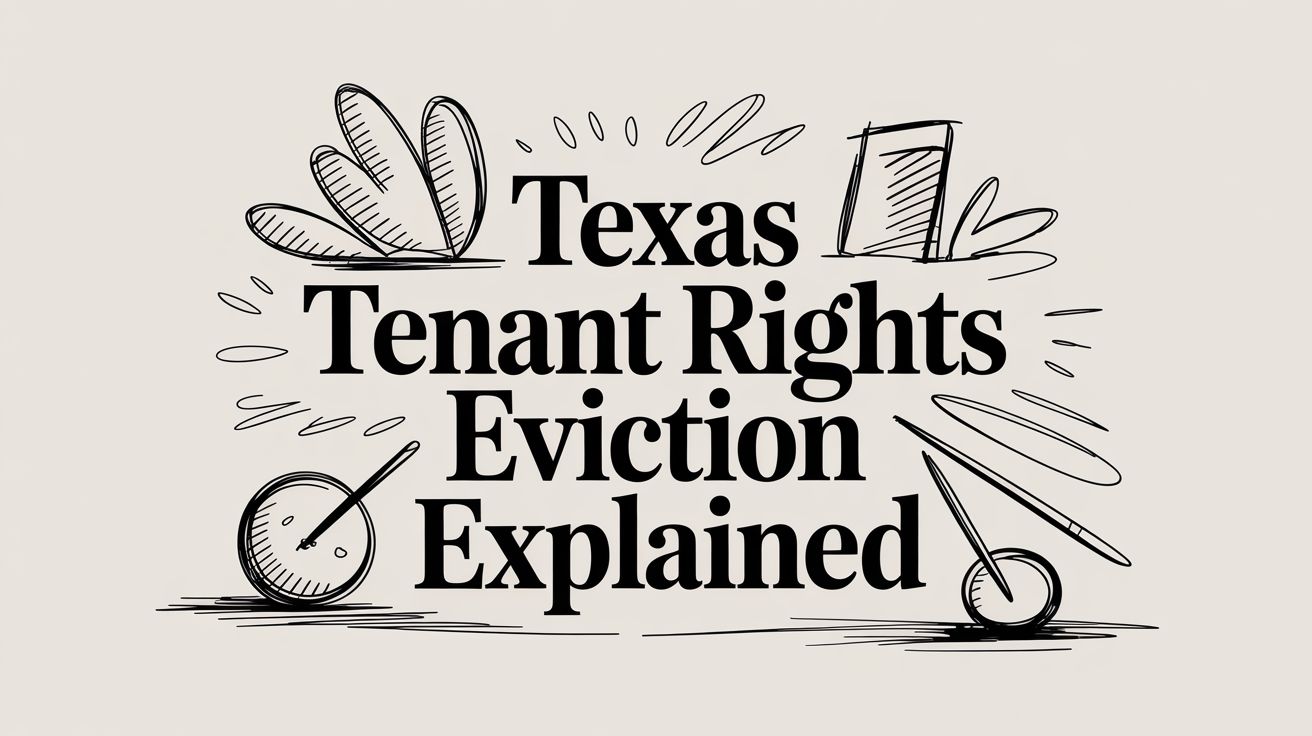
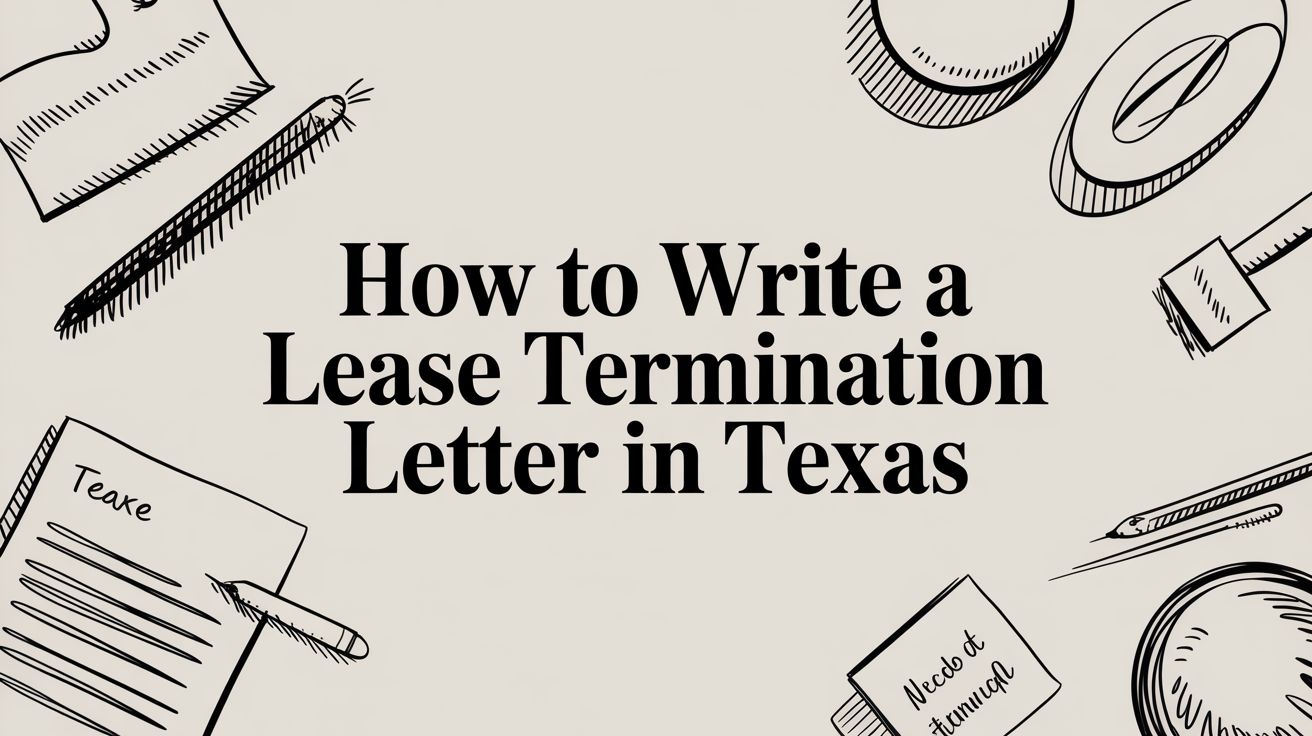
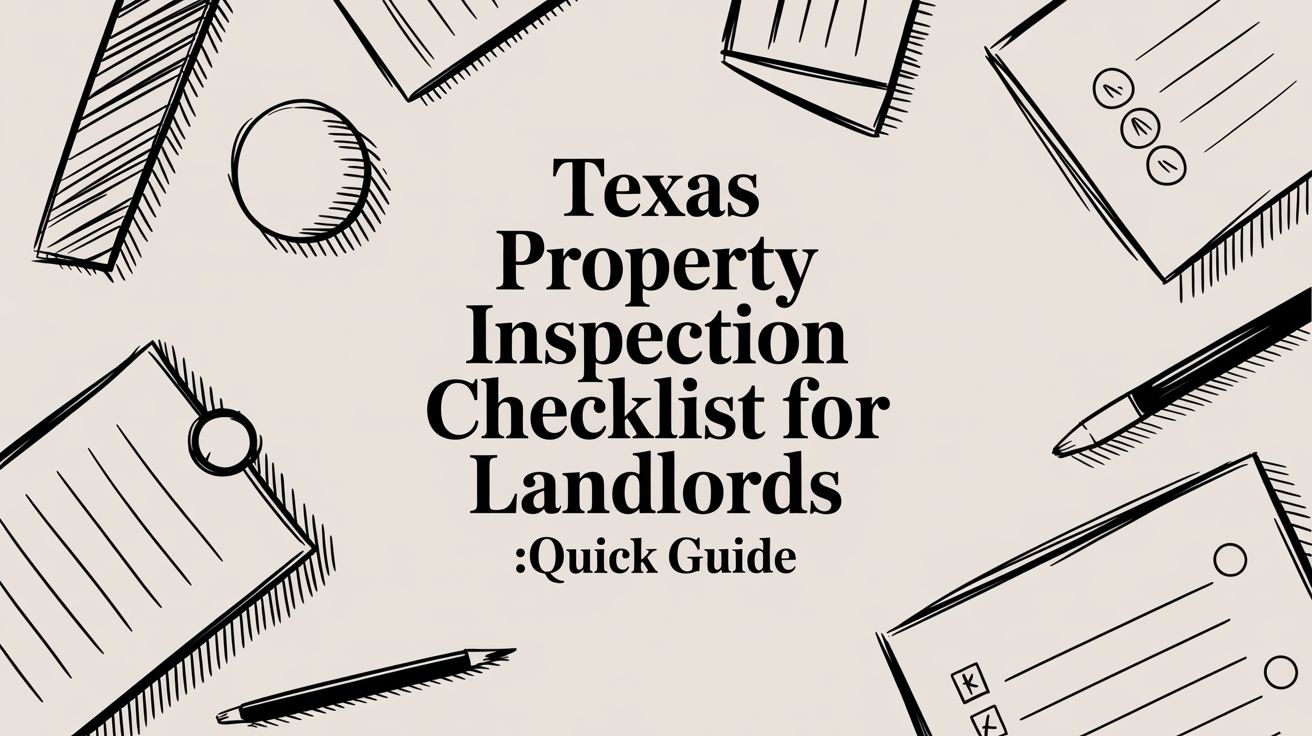
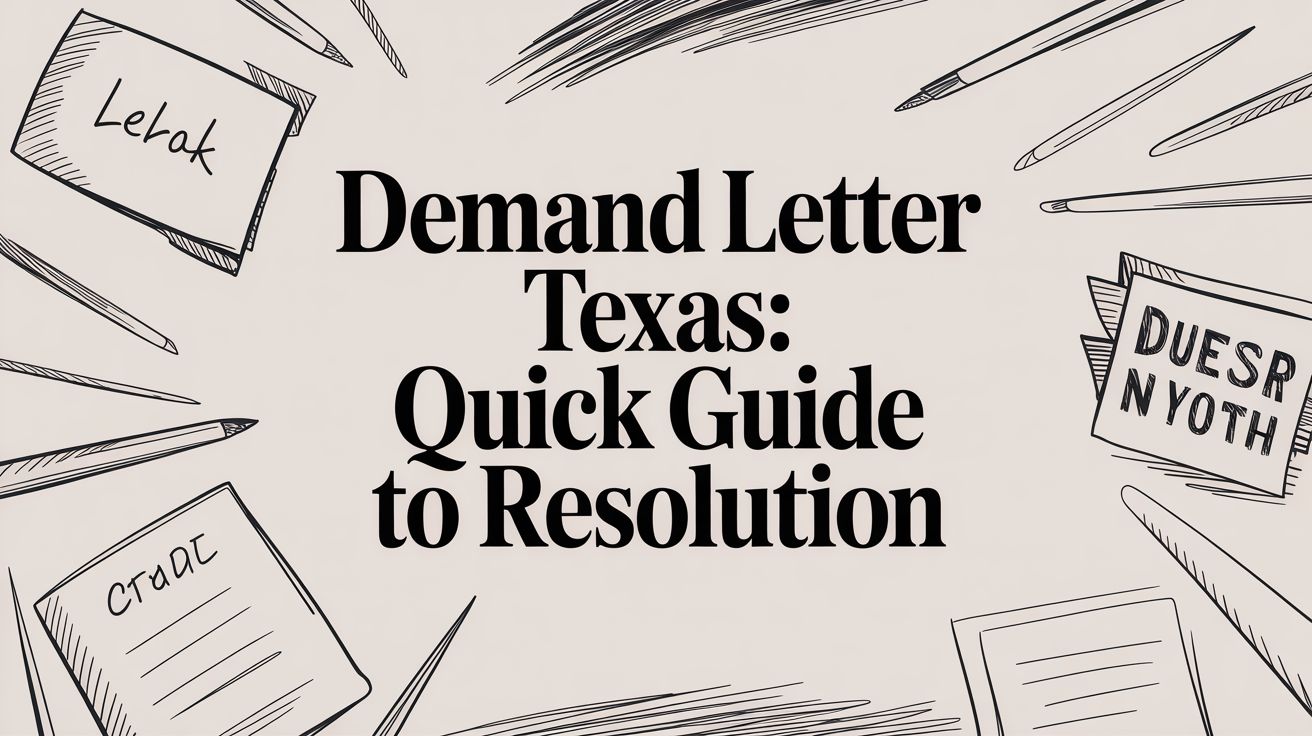
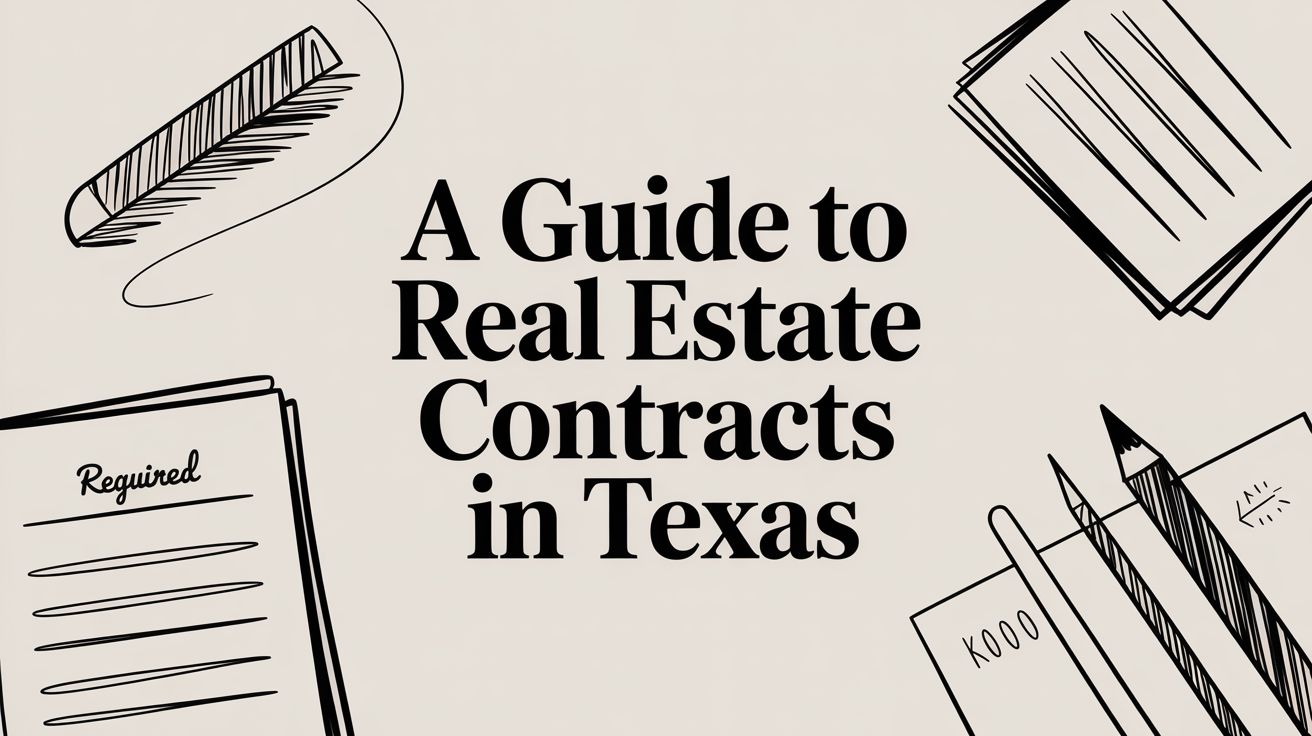
![Graphic design featuring the title "8 Valid Reasons to Break a Lease in Texas [2025 Guide]" with decorative elements like a pen and paper, emphasizing tenant rights and legal guidance in Texas.](https://texastenantlawyers.com/wp-content/uploads/2025/11/featured-image-7ebe2aec-eacb-4e61-8e85-9c298b07ad11.jpg)
